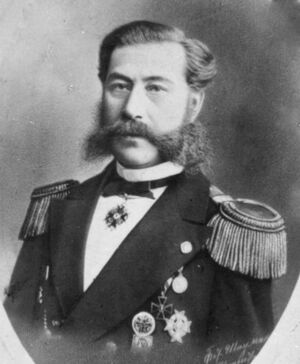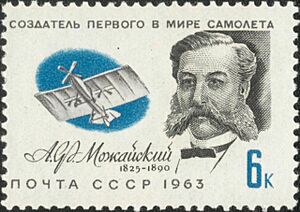Alexander Mozhaysky facts for kids
Quick facts for kids
Alexander Fedorovich Mozhaysky
|
|
|---|---|

Alexander Mozhayskiy
|
|
| Born | 21 March 1825 Rochensalm, Russian Empire (now Finland) |
| Died | 1 April 1890 (aged 65) St Petersburg, Russian Empire |
| Allegiance | |
| Service/ |
|
| Years of service | 1841–1882 |
| Rank | Rear admiral |
| Battles/wars | Crimean War |
| Awards | Order of St. Vladimir, 4th class Order of Saint Stanislaus, 2nd class |
Alexander Fedorovich Mozhaysky (born March 21, 1825 – died April 1, 1890) was a brave admiral in the Imperial Russian Navy. He was also a very important pioneer in aviation, which is the science of flying. He spent many years researching and designing machines that could fly, long before modern airplanes existed.
Contents
Life of Alexander Mozhaysky
Mozhaysky was born in 1825 in a place called Rochensalm. This area is now part of Finland, but back then it was part of the Russian Empire. His father was also an admiral, so Alexander grew up around the navy. He finished his naval training in 1841.
For the next seven years, Mozhaysky sailed on different ships. He explored the Baltic Sea and the White Sea. In 1849, he became a lieutenant. From 1850 to 1852, he served with the Baltic Fleet.
In 1853, he joined an important trip to the Far East. While in Nagasaki, Japan, he showed a working model of a steam engine. This helped a Japanese inventor named Tanaka Hisashige create his own version later.
Adventures and Challenges
In 1854, his ship, the frigate Diana, sank in a big earthquake near Japan. Mozhaysky helped build a new ship called Heda. This allowed the Russian team to return home after signing a treaty.
Later, during the Crimean War, he served in the Gulf of Finland. In 1858, Mozhaysky went on an expedition to Khiva in Central Asia. He wrote about the Aral Sea and the Amu Darya River. For his work on this trip, he received an award called the Order of St Vladimir.
After this, he became a lieutenant-commander. However, he left the navy in 1863. This was because the Russian navy became smaller after the Crimean War ended. From 1869 to 1876, he lived outside the city of Vinnytsia in what is now Ukraine.
Designing a Flying Machine
From 1876, Mozhaysky started working on a big project. He wanted to build a machine that could fly and was heavier than air.
He rejoined the navy in 1879 and became a captain. He also taught at the Sea Cadet Corps. In 1882, he was promoted to rear admiral. But he soon left the navy again for personal reasons.
Around 1884, Mozhaysky's airplane made its first attempt at flight. His design used a ramp to get speed. It did not rely on engine power alone to lift off. The wings of his aircraft were not curved enough to create the lift needed for sustained flight. It is possible the wings slowed its fall after launching from the ramp. However, they likely could not keep it in the air for long. This was due to the engines he had available. He also tried different angles for the wings to see how they would work.
Alexander Mozhaysky passed away on April 1, 1890. He is buried in the Smolensk Cemetery in Saint Petersburg.
Mozhaysky's Legacy
In 1909, a Russian newspaper claimed Mozhaysky's short flight was the first powered flight ever. This idea was repeated in many Soviet books. However, from 1971 to 1981, a research institute called the Central Aerohydrodynamic Institute studied his work. They found that Mozhaysky's original aircraft could not fly on its own. This was because its engine was not powerful enough. They also showed that if he had a stronger engine, which he planned to get, the aircraft might have been able to fly.
Even though his flight was not fully successful, Mozhaysky's work in aviation was very important. He made big steps in understanding how to control an aircraft and how to make it move. This was amazing, considering the limited technology he had. His achievements are now getting more attention.
To honor him, the A.F. Mozhaysky Military-Space Academy in St. Petersburg is named after him. Also, an asteroid in space, 2850 Mozhaiskij, carries his name.
See also
- Early flying machines
- Samuel Pierpont Langley, a U.S. scientist notable for his early powered aircraft flight attempts
- Clément Ader, a French inventor who designed a series of early steam-powered aircraft
- Mozhaysky's airplane
 | Toni Morrison |
 | Barack Obama |
 | Martin Luther King Jr. |
 | Ralph Bunche |


